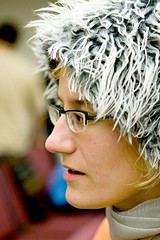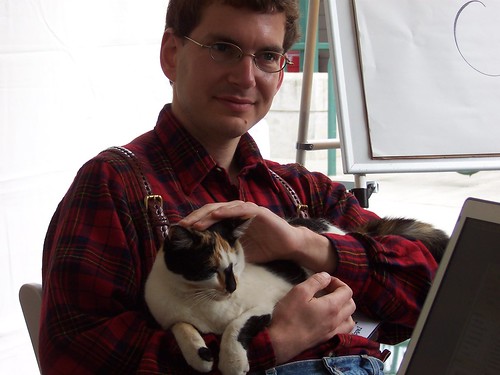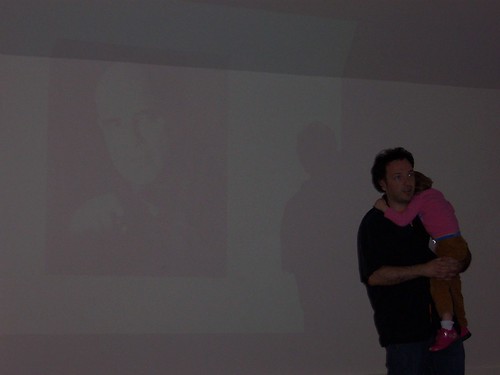Way cool! Here is the Firefox crop circle created in rural Oregon after OSCON. Unfortunately, I wasn’t involved in the crop circle, but I’m still waiting for our Cylon Raider from Foo to hit the maps.
Category Archives: foo
The Open Source Gift Guide
Make Magazine, the place where you can find instructions to make all sorts of strange things (the modern day MacGyver site), has released the “Open source gift guide – Open source hardware, software and more for the holidays” with many geeky gift suggestions for the open source hacker enthusiast. Tim O’Reilly adds his twist to the gift guide by suggesting donations to a variety of open source organizations.
My personal favorite from the list is the Chumby. I saw some early models at Foo, and they were way cool.
Why Attend Conferences? AKA Time for a Change
The buzz around the Web 2.0 Summit this week got me thinking about why we attend conferences in today’s world of near constant connectivity and information overload. I remember listening to TWIT sometime around CES when Dvorak talked about how he was “virtually”attending CES. He had decided to skip the travel and follow the news coverage virtually rather than physically attending the event. With thousands of other journalists in attendance, Dvorak decided that having one more technology reporter on the show floor was not a good use of his time.
Before every company had a website, before bloggers, and before RSS readers, we attended conferences because conferences were the primary mechanism for learning about new technologies. Now, we can read our favorite blogs, newspapers, and trade magazines from the comfort of our couches in our pajamas with wireless laptops. With so many great summaries of every conference appearing online and bloggers posting live updates whenever someone important sneezes, the need to attend conferences to gather information is greatly diminished.
Historically, we also attended conferences to hear the experts speak on relevant topics; however, podcasts are making conference keynotes, sessions, and even panels less relevant. I admit to being a podcast addict. I typically subscribe to more podcasts than any one human being could possibly process, but it does give me the opportunity to pick and choose based on my current interests. I regularly hear interviews with open source experts on FLOSS Weekly and the O’Reilly Foo Casts, web 2.0 experts on TalkCrunch, and a little bit of everything related to the tech industry from TWIT and PodTech. I do not need to attend a big conference to hear the experts and their latest ideas about technology.
Conferences have also become a mechanism for corporate PR and product launches designed to capitalize on the topical buzz around the time of a big conference, but in reality, the press releases and launches tend to get lost in the noise with dozens and even hundreds of press releases crammed into just a few short days. This is also a holdover from the days when people attended conferences to learn about the next new thing, and corporate types have the conference press release machine in motion.
I am not saying that we should stop attending conferences; however, our reasons for attending have changed over time. I currently attend conferences mainly to hold meetings with customers / partners and network with other smart people to generate new ideas and new ways of thinking about the tech world. The customer meetings and networking usually happen outside of the traditional conference format as lunches, dinners, and informal hallway conversations. Typically, I can learn more by spending 10 minutes in a hallway chat with someone than I can learn in an hour long conference session. Conferences are a great way to gather a whole bunch of experts and those wanting to learn more about a topic together in one place to facilitate learning and the sharing of new ideas and thoughts.
I am starting to wonder if technology conferences are due for a change. Maybe fewer talking heads and fewer keynote sessions with a larger number of small discussion groups giving people an opportunity to share ideas. I am also becoming a fan of the “un-conference” format popularized by FooCamp and BarCamp, which provide a framework for a conference where intimate discussions can be more easily organized; however, I do not know how well the un-conference format would scale when you get larger numbers of attendees. I recently had a discussion at a party with Identity Woman aka Kaliya who is an advocate for a hybrid approach like the un-conferences, but with a little more structure to keep people on track.
I am not quite sure if there is an “answer” to the conference dilemma, but I suspect that the time is right for a broader change in how we organize and attend technology conferences.
Danah Boyd: The History and Future of Social Networking
Financial Times calls Danah Boyd “The high priestess of internet friendship”, and the title is well earned. I attended a few web 2.0 sessions with Danah (and a few evenings of Werewolf), and this women “gets” social networking better than anyone else I know.
If you want to better understand the evolution of social networking and get a sense for where it is headed, this article based on a Financial Times interview with Danah is a great place to start.
Art of Community
I have been talking recently at conferences (OSCON and FooCamp) about the Art of Community as part of a project that Danese Cooper and I are doing for O’Reilly Media. We are in the process of writing a book on the Art of Community, which will start as a wiki with plans to write an initial first draft of the chapters, post them to the wiki, and allow the community to be our editors / collaborators on the project. We also plan to record a bunch of podcasts to include on the wiki and use as vignettes in the text of the book. We are still in the process of writing the chapter drafts, so the wiki is not yet public; however, we are looking for input and ideas.
If you have something interesting to say about community and would like to talk to us, please contact me: dawn at dawnfoster dot com.
On Foo and Elitism
There has been quite a bit of buzz recently about whether Foo is too exclusive and elitist. After attending my first Foo this year, I have been amazed by the controversy that Foo generates. Yes, only around 200 people are invited; however, keeping the numbers small helps facilitate the self-organization of the conference and allows us to fit (barely) within the O’Reilly campus. The reality is that companies all over the world hold invite-only events where they gather people together to hold discussions on topics relevant to their business.
From Tom Coates,
Everyone who attends FOO feels honoured to be there, but let’s be clear – invitation-only events happen all the time in the tech industry. There are more conferences and seminars happening in and around Silicon Valley than there are days in the year. And any individual or company is free to start their own event and invite whomsoever they choose. (Quote from Tom Coates on plasticbag.org)
Stowe Boyd makes a similar point:
But, candidly, I don’t get it. Why can’t we have closed meetings? Can’t a company like O’Reilly invite a bunch of people to get together and talk about issues that are important to the company’s future business? Does everything they do have to be open to the public, just because they are influential? (Quote from Stowe Boyd on /Message)
Foo just seems to generate more attention than other invite-only events. It may be a result of the breadth of the topics that O’Reilly is interested in discussing. O’Reilly Media is focused on cross-pollination between industries drawing on the idea that we can be smarter and more creative if we broaden our horizons … maybe this explains the popularity of the Werewolf games at Foo. People from across a broad swath of technology industries are invited to Foo, and with the 200 person limit, this means that many really smart and insightful people are not invited. Foo is also an amazing event, and attendees rarely if ever leave Foo with a negative impression, which means that many people naturally want to be invited. I was lucky to be invited this year, and I hope to be invited to attend next year; however, I will not have any hard feelings if I am not invited. People should be able to accept Foo for what it is … a great event where people share amazing ideas. Nothing more, nothing less.
Foo, Cats, and Kids (AKA Sunday Morning at Foo)
Despite being exhausted after two late nights of Werewolf (thank you to the kind werewolf who killed me off so I could go to bed last night), this has been a great morning of talks with a number of interesting themes.
Danese Cooper, Karl Fogel, and I led a session about the Art of Community, and we had a great discussion around the topic. We talked about how open source and other developer communities tend to start with a more tangible end goal, while other communities (social networking, communes) tend to be more about the evolution of the community than about the end goal. The tools also tend to be different across different communities with web 2.0 communities having intuitive user interfaces, while developer communities tend to use the techie tools that developers are comfortable with. The barrier to entry is also a bit higher for many developer communities while anyone can easily get involved in web 2.0 communities. We had an active and engaging discussion with participation from many different people. We even had a mascot for the session.
Geir Magnusson led a discussion about Web 2.0: Fact or Fiction starting with the caveat that he really didn’t know much about web 2.0, so he was hoping to learn from the group discussion. We talked about the definition of web 2.0 as a new method of using data: collective intelligence / user created content along with combining existing data in new ways (mashups). It was such a great discussion that I did not
Danny O’Brien talked about Cat Poop vs. Blogging related back to brain infections (you had to be there), and he even recruited a little help for the session.
Saturday Sessions at Foo Camp
Some of the morning was spent on the “Cylon Raider” project, but I attended several very interesting sessions. Here are a few of the highlights (these notes are a bit raw … in other words, forgive the typos):
In Democratization / Disintermediation of traditional media led by Jay & Kevin (Digg)
-
Mainstream media excels in areas where you have limited distribution (only so many people can be invited to White House press briefings, for example).
-
Media is changing and has a symbiotic relationship with the new media. Editors might look at sites like Digg to see user behavior trends and use that as an instant feedback mechanism to direct the edited content. Digg relies on traditional media for much of the content.
-
Competition for advertising dollars is really hitting the traditional media. Local newspapers are losing ad revenue to other advertising mediums – classifieds is where it’s starting, but it is involving into other areas. Bloggers who do reporting rather than relying on mainstream reporting will get more attention (TechCrunch) and more advertising dollars.
-
Opinion pieces and magazines are being eroded by new media
-
New media excels for speed of information vs. the accuracy / fact checking of traditional media.
-
Sites like Digg usually have a self-policing mechanism within the community.
In Passionate users – Kathy Sierra
-
People are passionate about the things they kick ass at, and they have a higher resolution experience – they pick up on things that the rest of us would not (jazz musicians, etc.) We want to create this for our users.
-
It’s not about the tools – it’s what you do with them – focus on the end result, not the tool.
-
Decisions are usually based on emotions – we are just not always rational / logical.
-
Keep users engaged.
-
Don’t want to interrupt the flow of what you are doing – if the software interrupts and become aware of the tool, the flow and outcome are disrupted.
-
Learning increases resolution.
-
If you want the user to RTFM, we need to write a better FM.
-
Pictures and surprises get people’s attention.
Doctor Who vs. Snakes on a Plane: Lessons from Fan Culture for Community Builders. Annalee Newitz
-
Fan culture – free collaborative narratives often incorporating elements of commercial culture.
-
Lessons:
-
Not all fans are good producers of fan culture
-
beaing a fan makes you a better creator
-
communities united around collaborative storytelling can last for an extremely long time.
-
Not all fan culture can be turned into commercial culture
-
communities can be quickly united by satire, but satire doesn’t last
-
“buzzers” do not equal “buyers”
Note: The fan culture session relates back to the passionate users session. Fan culture seems to have some of the most passionate users coming together on a topic. We also had an interesting discussion about how more of these fan communities seem to be based around sci-fi. I’m not sure whether this is because we had a really geeky audience or because people who watch sci-fi tend to be a bit more fanatical than the rest of the population.
Cylon Raider at Foo
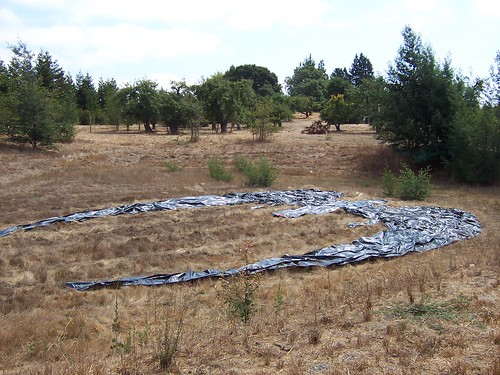
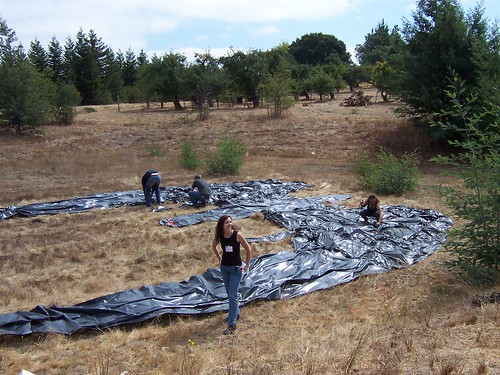
They are doing a flyover for Google Maps at noon today, and we decided that the O’Reilly campus needed a Cylon Raider. More pics on Flickr.
